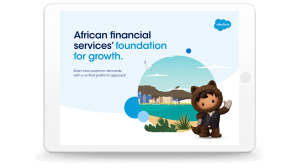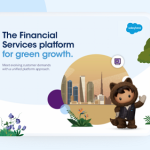“African Financial Services’ Foundation for Growth” explores some of the major challenges and opportunities facing financial services firms in the region, and how to compete in the evolving battle for customer satisfaction. By reading it, African financial services firms will gain insight into how to become smarter, better-connected players in the market, as well as some of the financial businesses that are doing this successfully with data and technology.
African Financial Services’ Foundation for Growth
How African financial services firms can develop more personalised, attentive, and trusted digital client relationships with their growing customer base.

The African landscape – geographical and sociological – has had a huge impact on how financial services are delivered across the continent. It’s a region of incredible variety, ranging from intensely populated cities to vast and remote areas of land and highly distributed populations, and combines affluent city dwellers who have access to a wide range of financial institutions and technologies, with neighbourhoods with poor local economies – and where there’s still no fixed-line networking.
It’s why financial institutions operating in Africa have always had to have some element of innovation in their operations and service offerings. We saw this in Kenya in the 2000s, when a lack of fixed-line infrastructure meant banks simply couldn’t support the more traditional branch-based banking model in many areas. Yet because the same issue had simultaneously driven high mobile phone adoption, Kenya saw the launch in 2007 of one of the world’s first mobile payments solutions, M-PESA – long before the UK’s first equivalent system in 2011.
A time of great change
Today, as communications technology becomes even more ubiquitous, an even greater proportion of the population has access to banking and financial tools: Africa is becoming a more inclusive digital economy. The use of mobile money and e-commerce has opened up financial services to a greater proportion of Africa’s inhabitants, and the demand for new services based on these strategies. The global Covid pandemic has also unearthed new needs. Consumers who previously had access to a bank branch for their financial transactions, for example, now require (and expect) to be able to perform financial activity through low-contact services, removing the need to attend a branch at all.
It’s great news for financial services firms already operating in Africa, but it has resulted in an increase in competition from new, digital fintech – startups that are often built to be digital-first, with lower cost of entry and greater flexibility to make business model changes. Another challenge is that B2B and B2C customer expectations have risen. In the business world, organisations expect banks to offer cost-effective digital services that go beyond traditional banking solutions. Meanwhile, consumers want the convenient, personalised experiences that are becoming the norm in their everyday lives.
So everyone in Africa wants more from financial services. But how can traditional firms beat the competition and secure their place in the future African financial ecosystem?
1. Trusted relationships built on agile technology
To increase customer trust, financial services firms need to understand and be able to consistently deliver, the experience that today’s African businesses and consumers are looking for – and go to market quickly when they do. This is traditionally a sweet spot for new wave, digital-only market entrants, or traditional banks with huge funds from global backers. But Salesforce makes the agile technologies this needs available to any firm, so they can bridge gaps in service delivery and beat the competition. Salesforce helps organisations harness technologies that enable greater customer-centricity, risk management, and e-commerce and, thanks to a unified platform for intelligence, be able to convert data into personalised, seamless experiences.
2. A platform and partner for growth
In line with global trends, African businesses and consumers increasingly expect personalised multichannel relationships – they want to access services how and when it suits them. Firms need to be able to deliver this quickly and at scale as demand grows. With Salesforce’s ability to deliver intelligence, automation, and a unified data culture, firms in Africa are already seeing how they can evolve to meet today’s challenges – 41% of Salesforce’s financial services customers have reported an increase in customer satisfaction. Artificial Intelligence automatically discovers relevant client insights, predicts figure outcomes, proactively recommends the best next steps, and even automates routine advisor tasks to help advisors focus on delivering value for clients and building trusted relationships.
3. The right tools at the right time
No matter where you are in the world, financial services businesses need the right foundations, with core tools that deliver the information and services when and where they’re needed, at the time they’re needed. Salesforce Financial Services Cloud acts as a single source of truth for firms, with tools and support for engagement, insight, and efficiency tailored to the specific needs of financial services providers. This technology is designed to help firms deliver intelligent, customised, and proactive advice for customers. Salesforce Financial Services Cloud is already enabling thousands of financial services organisations to scale up their digital engagement, create an effective, connected data culture, and perhaps, most importantly, meet evolving client expectations, deepen relationships, and win loyalty.
4. Future-ready finance
Financial services organisations in Africa know that they need to respond to today’s market conditions and create a solid foundation for future growth. It means putting in place technology and services that enable more personalised, attentive, and trusted digital relationships. Salesforce is the market-leading partner for organisations looking to achieve this and make a real difference to businesses and economies throughout Africa.
African Financial Services’ Foundation for Growth
How African financial services firms can develop more personalised, attentive, and trusted digital client relationships with their growing customer base.

























